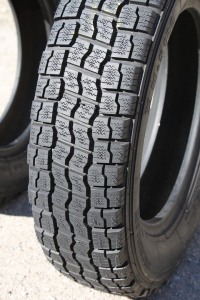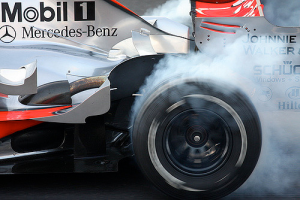Tires VS. gas mileage
A tire seems like a simple car part. A bit of rubber and some steel belts–there’s really no much more into it, right? Well, you’re mistaken if you believe this is true. Tires are as complex as any other car part and, if you’re a car owner, you simply have to know more about them. After all, it’s your tires that connect you to the road and help you stay safe. They also can have a significant impact on your gas mileage. Being a car enthusiast myself, I’ll be happy to provide you with all the important info about car tires. So, buckle your seatbelt and, get ready to do some reading.
Tire – more than a chunk of rubber
As I mentioned above, many people believe that car tires are nothing but pieces of rubber that get attached to the wheels. Still, the

anatomy of a car tire is much more complex. First of all, there’s tread, which is the part that actually gets in contact with the road. Over the years, engineers have done a lot of research to find out which is the best tread pattern car owners should use. Tread voids and rain grooves are also parts of a car tire. Even though they’re two different things, they’re used for the same main purpose–improving traction by channeling water away from the tread. The bead of a tire is the part closest to the rim. It’s made of high-strength rubber and it’s reinforced with steel. This tire part forms a tight seal in order to prevent air leakage. The sidewall, which is connected to the bead and tread, is also made of rubber reinforced with steel cords. This is usually where you can find mandatory warnings and codes by the manufacturer.
Fuel Economy
You probably already know that cold weather and your speed affect your gas mileage, but what if I told you that that the size and weight of your tires has something to do with it as well? That’s right. According to recent studies, the size and weight of your tires have a 4-to-7 percent impact on your fuel economy. Of course, this depends heavily on whether you’re driving around town or on an open road. The size and weight of your tires affect your gas mileage because of something called “rolling resistance.” Basically, this is the friction your tires cause while on the road. Larger tires tend to create more friction than small ones, which causes them to decrease your fuel consumption. Also, there are tires that have been specially designed to lower your fuel consumption. Some fuel economy-focused tires might include Nexen N’Blue Eco, which have great wet handling and braking performance. This tire also performs above and beyond. I collected a few data points when I switched over from my old Goodride low-rolling-resistance tires and compared the results. What my data concluded is that the N’blue Eco tire showed a two percent decrease overall in fuel consumption (strictly city driving about a mere 0.5 percent, while highway showed a strong 2.5 percent decrease) over my old economy tires. I should also mention that the tread on these provides uniform distribution of contact pressure, which means it lasts longer than the tread on standard tires.
Immortal tires–Myth or fact?
Even though it would be great to have tires that never wear out, we still don’t have tires that last forever. Engineers are working on designing tires that will last much longer, and we could see these hit the market in the near future. While we’re waiting for these, we should do whatever we can to ensure we visit tire shops less often. Luckily, there are tricks that are guaranteed to help you do this.
First of all, you should make sure you rotate your tires from time to time. I rotate mine every 8,000 km (5,000 miles)–this helps me

stay safe on the road and my tires last longer. Also, heavy acceleration, especially at low speeds, can put a lot of strain on the rubber, so make sure you avoid it (this will help your mpg as well). You should also bear in mind that the roads you travel also tend to have a huge impact on how long your tires are going to last. For example, if you drive on well-maintained city road, your tires will last much longer than they would if you would drive on a highway full of potholes.
It’s safe to say that tires are one of the most important parts of your car. And choosing the right tires for your car and maintaining them properly is a critical part of getting as much as possible out of your driving experience.

1 thought on “The Humble Tire, What You Must Know!”